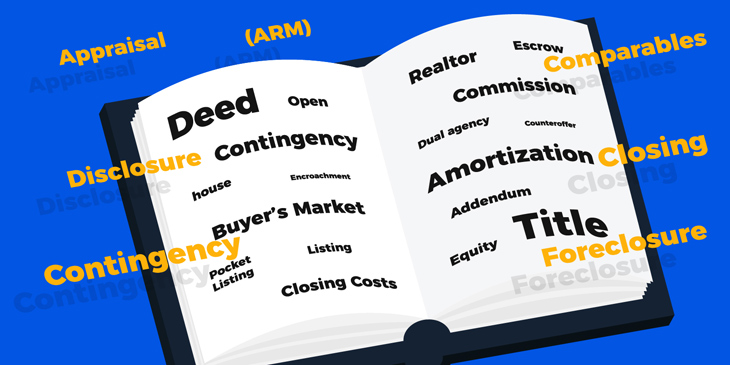We have put together a list of 132 essential real estate terms, and simplified them. This blog post covers terms from A to Z.
Industry Insights New Agents
How often do you find yourself explaining real estate terms to your clients?
If you’ve been working as a real estate agent for a while, it’s safe to say that it’s been a lot. As frustrating as that can be at times, it’s actually a good thing to get these kinds of questions. Not just because part of your job is to educate your clients, but also because by answering questions, you prove your expertise and make your clients feel more confident in your abilities.Wouldn’t it be great if explaining real estate terms were a little easier, and you had a concise guide that explained some of the most important real estate terms in simple terms?
If so, good news! We’ve put together a list of some of the most common and important real estate terms your clients often ask about. That way you can send this list to them, or use it to refresh your own memory as needed (or maybe even learn a few new terms yourself).
Let’s get started:
1. Absorption Rate
In real estate, a market’s absorption rate refers to how quickly the market absorbs or gets rid of its housing inventory. In other words, how quickly the current inventory gets sold off.
The absorption rate is an important metric for licensed real estate agents and clients because it can provide a snapshot of the current state of the current real estate market and give you a good idea about how hot the market is, how quickly you can expect to sell a new listing, and whether right now it the right time to sell a home.
The market’s absorption is calculated by dividing the number of homes sold in a specific period of time (such as the last 6 months) by the total housing inventory in a given area.
Example:
Let’s say that your city has 3,000 homes for sale. If home buyers purchase 500 homes per month, the absorption rate is around 16% (500 sold homes divided by 3,000 home inventory).
Traditionally, an absorption rate above 20% indicates a seller’s market, while a rate below 15% indicates a buyer’s market. And between 15 and 20% indicates a balanced market, where neither buyers nor sellers have an advantage.
2. Adjustable-Rate Mortgage (ARM)
An adjustable-rate mortgage is a type of mortgage whose interest rates vary throughout the life of the loan.
Most ARM mortgages’ interest rates start out as fixed for a certain amount of time. After that, the interest resets periodically at a certain period of time, which could be yearly, bi-yearly, and even monthly.
The most important feature of an ARM are:
- Initial interest rate: The ARM’s initial interest rate.
- Adjustment Period: The length of time in which the ARM’s initial interest rate remains fixed. This period varies from lender to lender. But at the end of it, the ARM’s interest rate is recalculated periodically (usually monthly).
- Index: The index that the lender uses to adjust its interest rates. Indexes vary from lender to lender, but some of the most commons are the maturity yield on one-year treasury bills, the 11th District Cost of Funds Index (COFI), and the London Interbank Offered Rate (LIBOR).
- Margin: The percentage points that lenders add to their index rate in order to calculate the ARM’s actual interest rate.
- Interest rate caps: The limit to how much the interest rate or the monthly payment can be adjusted each time the interest rate is recalculated.
- Initial discount: A promotion that many mortgage lenders offer at the beginning of an ARM. Many times the initial discount offers interest rates below the average rate for a limited time in order to attract more clients.
- Conversion: A clause that allows borrowers to convert their ARM into a fixed-rate mortgage at fixed points throughout the length of the ARM loan.

3. Addendum and Amendment
There are times during a transaction in which some issue comes up that may make it necessary to make changes to the contract. Either because of previously undiscovered issues (but hopefully not undisclosed on purpose) with the home rear their ugly head (such as a leaky roof), or other reasons.
If this were to happen, the seller’s agent would have to add an amendment (or change) to the contract. This amendment is usually a page long, and refers to the original purchase and sale agreement, and needs to be signed by both the buyer and seller.
On the other hand, an addendum is an addition to the contract. This could happen when, say, the buyer wishes to keep the seller’s furniture, light fixtures, etc.
In short:
Addendum = Addition to contract.
Amendment = Change to contract.
4. Amenities
Amenities are the extra features, item, and appliances that Airbnb hosts provide with their listings. The most popular amenities are typically a swimming pool, a fully stocked kitchen, parking on the property, WiFi, and others.
5. Air rights
Air rights are the rights to “build up”, meaning to add floors to the property.
6. Amortization
Of all real estate terms in this list, this is probably the most beneficial to buyers. Amortization is the process of spreading a loan payment over an extended period of time, by scheduling monthly (or bi-monthly) payments. These regular payments are split into two main portions: principal and interest payments.
By spreading loan repayments over a long period of time, amortization allows the majority of us to buy goods we otherwise couldn’t afford, such as homes, new cars, etc.
In the case of mortgages, the amortization period is typically between 15-30 years, though longer and shorter amortization periods are not unheard of.

7. Appraisal
Appraisal refers to the process of calculating the real market value of a piece of property by a qualified expert. The main objective of an appraisal is to help lenders determine the real value of a home in order to not lend the borrower more money than necessary.
If the property’s value appraisal is lower than what the buyer offered, the lender could ask the borrower to cover the difference himself.
8. Appreciation
Real estate appreciation refers to the increase in the value of a real estate property over time. Natural appreciation happens as a result of market forces such as inflation, increased demand, or weakening supply. Forced appreciation occurs when you make intentional improvements on a property to increase its value.
9. Assessment
Assessment in real estate is a process almost identical to an appraisal in that both terms refer to a calculation of a property’s value. But the main difference is that an assessment is done by the local government, primarily to calculate a home’s value for property tax purposes.
10. Bank-Owned Property
A bank-owned property, or a real estate owned (REO) property, is a property that is reverted to the lender after it doesn’t sell at a foreclosure auction after the borrower has defaulted on mortgage payments.
11. Balloon Mortgage
A balloon mortgage is a short-term loan, usually between 5 to 7 years long, that has an initial period of low or no monthly payments. However, at the end of its term, the borrower is required to pay off the full balance in a single lump sum.
The monthly payments typically have a very low-interest rate, and sometimes the borrower only has to pay the interest.
This type of loan is usually used by home flippers, construction companies, and investors who rely on year-end bonuses for the majority of their income.
12. Blanket Mortgage
A blanket mortgage is a loan that gives borrowers the opportunity to buy multiple real estate properties with one mortgage. Instead of having several mortgages for multiple properties, this mortgage allows borrowers to use a single mortgage to buy multiple properties.
13. Blind offer
A blind offer in real estate is a contract to purchase a property without seeing it. Blind offers save buyers and sellers tons of time by skipping inspections or appraisals.
14. Breach of Contract
A breach of contract occurs when the buyer or seller violates any of the terms or conditions of a legally binding contract.
This violation could range from something minor such as being late on a payment to something serious such as failing to deliver an asset, completely stopping payments, etc.
15. Building codes
Building codes are the legal rules and standards of properties set in place for the protection of public safety.
16. Buyer’s Agent
A buyer’s agent is a licensed real estate agent who is focused on representing home buyers’ interests to find the right property and complete the real estate transaction.
A buyer’s agent’s responsibilities include negotiating the best possible price for a home, securing the best terms, researching the home’s neighborhood and the surrounding area, making sure the home has been thoroughly and properly inspected, and facilitating the buying process for their client.
17. Buydown
A buydown is a financing solution in which the borrower secures a lower interest rate for the first few years of the loan term by paying more upfront. By paying a large sum upfront, the borrower can take advantage of the buy down to pay a lower interest rate for a short period.
18. Buyer’s Market
Whenever a housing market has a larger housing supply than demand for an extended period of time, causing buyers to have the upper hand in price negotiations, we can say that the market is a buyer’s market.
19. Capital Gains Tax
Capital gains tax is a type of property tax paid on the profit of the sale of a real estate property. The rate depends on the length of ownership before selling the property, taxable income, and filing status. When you have held a property for less than 12 months before selling it, short-term capital gains tax is paid. The tax rate is the same as normally income tax. If you have held the property for 12 months, long-term capital gains tax will be paid.
20. CapEx
CapEx, or Capital Expenditures, are new purchases or major home renovations that extend the life of a property. Some examples include: repairing a roof, adding an extension, and updating the basement. CapEx also covers the equipment and supplies required to make these changes. These are typically one-time, major expenses.
21. Cash Flow
The amount of money that an investor has at the end of each month after all operating expenses are paid out (including loan payments). Cash flow can be positive or negative. For example. if you spend less money on managing your rental property compared to what you earn from it, you will have a positive cash flow. If the cash you spend is more than the cash inflows, you have negative cash flow. Negative cashflow indicates that you are losing money from your investment.
22. Class A Building
Class A building refers is a grade given to a high-end property that has been recently constructed (within the past 10 years) or updated, that has high-quality amenities, and is located in a premium neighborhood. These buildings are low-risk real estate investments, but they are also more pricey than other classes.
23. Class B Building
Class B building refers to a grade given to generally decent property that was constructed between 10-30 years ago, with safe features in an attractive market. These buildings typically land comfortably between price and risk when investing in real estate.
24. Class C Building
Class C building refers to a grade given to an old property (more than 30 years), with outdated systems, and in a less-than-optimal location. These buildings are affordable, however, they are risky investments.
25. Closing
A closing is the final and most crucial step of a real estate transaction. During a closing, the property title passes from the seller to a buyer, all participants review, authorize, sign and date a number of legal documents (which vary from state to state).
Once the ownership of the property is successfully transferred from seller to buyer and the escrow company pays all relevant parties, then the buyer will be able to start moving in and/or begin renovating their new property as he/she sees fit.
26. Closing Costs
A real estate transaction’s closing costs are all the expenses that take place in the home purchasing process, beyond paying for the property’s agreed-on price tag.
These closing costs include (but not limited to) loan origination fees, appraisal fees, title insurance, property taxes, credit report charges, etc.
While there is no official enforceable law that determines which party pays for which closing cost, traditionally the buyer is expected to pay for any mortgage origination fees, while the seller pays real estate agents’ commissions and other fees related to the transfer of property.
But just like the listing price is negotiable, who pays for which closing costs can be negotiated as well.
27. Commercial Real Estate
Properties that are used for business purposes instead of living or residential purposes are referred to as commercial real estate. Some examples of commercial real estate properties include office buildings, malls, clinics, restaurants, and hotels.
28. Co-borrower
A co-borrower (also known as the co-applicant or joint applicant) shares an equal responsibility for paying off the loan as the primary borrower. Both borrowers have equal access to the funds.
29. Commission
In real estate, the commission is the real estate agents’ fee for providing their services to buyers and sellers. In a typical real estate transaction, the seller agrees to pay a certain percentage of the home’s sale price to the seller’s agent. The seller agent then offers around half of that commission as an incentive to a buyer’s agent that brings a qualified buyer.

30. Commitment Letter
A commitment letter is a formal, legal and binding document that a lending institution gives to a borrower as proof of an agreement to loan him/her a specified amount of money to purchase a home or property.
This letter contains all the terms and conditions of the loan, including the interest rate, index, repayment terms, closing conditions, etc.
The main purpose of a commitment letter is to let the applicant know that his/her application has been fully processed, and the funds are available to the applicant. But in order to have access to those funds, the borrower must meet all the terms and conditions outlined in the commitment letter.
This commitment letter can be used by the borrower to prove to the seller that he/she has access to enough funds to purchase the home, and will be able to close the transaction within the agreed-upon period of time.
31. Common Areas
Commons areas are amenities that home and apartment owners in a gated community, apartment complex and other multifamily complexes have collective access to.
These could include gyms, lounge areas, golf courses, pools, community gardens, basketball courts, and parking lots.
32. Comparables
Comparables (commonly referred to as “comps”) are homes that were sold recently in the area around a property being evaluated.
Comps are used in home valuations to get a fair value estimate of how much the market is willing to pay for the home being sold.
Comps are used both by individual real estate professionals doing unofficial property assessments, as well as by professional property appraisers.
33. Comparative Market Analysis
A comparative market analysis is the process of using comparables properties to calculate how much the market is willing to pay for a home.
Since no two properties are exactly the same, and many factors can affect the property value of a property, a market analysis must account for those differences (such as location, age, amenities such as a swimming pool) when coming up with a price estimate.
34. Conspiracy to boycott
A conspiracy to boycott occurs when two or more individuals or entities plan to restrict the ability of someone to compete. This is unethical and illegal.
35. Contingency
There are times when a real estate transaction doesn’t go quite as planned, or a homeowner faces economic difficulties, health problems, etc. after purchasing a home.
These unfortunate events are called contingencies.
To plan for contingencies, home buyers are recommended to set aside a certain amount of money as a cushion in case of emergencies.
Real estate agreements can include contingency clauses in case something goes wrong during the buying process. That way buyers have the right to back out of the deal or demand certain amendments to be removed or added into the contract.
36. Cosigner
A cosigner is legally responsible for making payments on the loan if the primary borrower misses payments or defaults on a payment. A cosigner usually has higher credit scores and is more financially stable than the borrower. This creditworthiness allows the cosigner to help the borrower qualify for the loan.
37. Counteroffer
A counteroffer is a rejection of the homebuyer’s original offer, which is then replaced with another offer by the home seller.
This counteroffer gives the buyer three options: accept the counteroffer, counter the counteroffer, or reject it altogether.
38. Certified Brokerage Manager (CRB)
A CRB is a professional title for experienced owners of real estate firms, real estate brokers, executives who want to raise their professional standards and grow the operation of their business and branch offices.
39. Credit Score
A credit score is a numerical value that evaluates the creditworthiness of an individual based on an analysis of their past credit activity. Credit scores are usually used by lenders to determine if someone qualifies for a loan, and if so, the proper credit limit and interest rate.
40. Debt-to-income ratio
The debt-to-income (DTI) ratio is a metric used to measure a person’s ability to repay their loans. This ratio takes the amount a person’s gross income goes towards paying off his/her debt each month and divides it by their gross income.
The DTI metric is commonly used by mortgage lenders as part of their algorithm to determine whether to give out a loan or not.

41. Deed and Title
Deed and title are terms that are often used interchangeably in everyday speech, kinda like car and automobile.
But legally speaking, there’s a significant difference.
“Title” is legalese for the concept of ownership. A person can hold title (or ownership) over tangible goods such as a home or car, or intangible ones, such as a patent, a business idea, a song, etc.
A deed, on the other hand, is a legal document that gives evidence of a person holding title of a piece of property.
42. Deed restrictions
Deed restrictions are limitations on the use of the property legally imposed by a past or current owner and are usually bound forever.
43. Depreciation
In everyday speech, the word depreciation is used to describe a good, such as a car, losing value over time due to the normal wear and tear of usage.
Depreciation is typically considered negative since it implies a loss of value. But in real estate investment, depreciation could actually be beneficial.
Structures, appliances, toilets, sinks, cabinets, and pretty much everything attached to a piece of property (with the exception of the land itself) depreciates as time goes by.
Many states allow the owner of a property to take a tax deduction to offset the property’s normal depreciation. But if the property is an income-generating investment, such as an apartment building, the value of the investment itself APPRECIATES over time (as yearly rent increases take place).
Thanks to the property’s depreciation tax deduction, the owner of the property pays fewer and fewer property taxes as time goes by, while at the same time their property’s cash flow increases.
44. Digital Real Estate
Digital real estate refers to any online property that you can buy, rent, or sell to gain a profit. Recently, digital real estate has been used to refer to the metaverse, within which investors can trade with virtual land and properties.
45. Disclosure
A seller disclosure is a document provided by a home seller to a home buyer that lets the buyer know (discloses) known issues with the property, it’s immediate environment (such as air and sound pollution), historical property maintenance requirements, and other factors required by law to be disclosed.
46. Distressed Property
A distressed property is a real estate property whose owner does fail to make mortgage payments on time, putting it at risk of foreclosure or repossession by the bank.
47. Down Payment
A down payment is a one-time payment made in cash, required by a financial institution before releasing funds for the purchase of an expensive good (in the case of real estate, a property).
This down payment is typically a certain percentage of the entire purchase price. For example, many homebuyers make a down payment between 3-25% of the total value of a home, while the bank covers the rest of the cost.
48. Dual agency
A dual agency is a situation in which a real estate agent or real estate broker represents both the buyer and seller.
Dual agency is prohibited in many states due to the inherent conflict of interests it causes for the agent. It’s often frowned upon even when the law allows it, since the agent can’t possibly push for the best interests of either client, without sacrificing the best interest of the other.
We know that part of your responsibility as a real estate agent is to explain real estate jargon to your clients. But it’s not always easy to do so. You may understand the terms yourself, but putting them into everyday language is often challenging.
49. Earnest money
Earnest money (also known as good faith deposit) is a cash deposit a buyer makes when the sale contract or purchase agreement is signed, or alongside his offer. This deposit is made in order to show how serious the buyer is about purchasing the home.
Though there are no real rules as to how much money should be deposited in a good faith deposit, it’s typically between 1-5% of the property’s purchase price. This money is then deposited on an escrow amount, where it will typically be used to cover some of the closing costs.
It’s important to note that earnest money is NOT the same as the down payment.
50. Encroachment
Encroachment happens when a homeowner builds or extends a structure into his neighbor’s property, either accidentally because he doesn’t know exactly where his property boundaries are, or deliberately due to maliciousness.

51. Exclusive listing
An exclusive listing is a real estate agreement where a seller grants a real estate agent the exclusive right to sell their home. This is a common type of listing that ensures the agent or realtor will be compensated for their time and work.
52. Escrow
An escrow is a financial instrument in which a neutral third party holds on to funds in behalf of two parties (such as a home buyer and seller), until both parties meet their agreed-upon contractual obligations.
The escrow will make sure all parties are properly paid at the end of a closing.
A seller will want assurance from the buyer near the end of the housing transaction that they will be given the money from the buyers once the deal has been finalized. Escrows will make sure the buyer’s money is secured by a third-party until the transaction is completed. Once it has the money will be transferred to the seller.
53. Equity
In real estate, equity the difference between what the current market is willing to pay for the property vs the amount the owner still owes on the mortgage.
If the value of the home exceeds the amount the owner still owes, we say that it has positive equity. But if the value of the home is lower than what the owner still owes, it has negative equity, and we that the mortgage is “underwater.”
54. Fair Market Value
A property’s fair market value (MFV) is the price that the home would sell at, given the current assumptions:
- Both buyers and sellers are well informed about the value of the asset.
- Both buyers and sellers are looking out for their own best interests.
- Neither buyers nor sellers are under any undue pressure, coercion, or intimidation.
- Both parties have enough time to make their decision.
55. Fair Housing Act
The Fair Housing Act of 1968 is a federal act that prohibits housing discrimination based on demographic information such as: race, nationality, religion, gender, family status, and disability.
56. Federal Housing Administration loans (FHA loans)
The Federal Housing Administration or FHA loan is a type of mortgage that is issued by the lender that’s been approved by the FHA and insured by the agency. The conventional loans provided by the FHA are intended for low to moderate-income homebuyers and require a low down payment and credit score compared to types of loans.
57. Flipping
Flipping is a short-term real estate investment strategy where a house flipper buys a property in a distressed condition, renovates it, and then sells it at a higher price. The profit on this property is the difference between the sale price and the sum of the purchase price plus the cost of updates.
58. Financing
In the world of real estate investing, financing refers to the method of securing the necessary capital to purchase an investment property and what percentage of the price is covered by the investor’s own funds.
59. Fixed-Rate Mortgage
A fixed-rate mortgage has an interest rate that remains the same throughout the loan’s lifetime, allowing borrowers to know exactly how much they will pay each month for their mortgage.
Because of this reason alone, the majority of home buyers choose fixed-rate mortgages, with around two-thirds of home buyers choosing them over adjustable-rate mortgages.
60. Fixer Upper
A Fixer upper is a real estate property that is in poor condition and requires a lot of repairs, although it could be in a liveable condition. Fixer-uppers are sold at reduced rates and hold a strong potential for appreciation, which makes them attractive investment properties.
61. Foreclosure
The legal process happens whenever a property owner ceases their mortgage payments, doesn’t make up for their missing payments within a grace period, and come to no forbearance agreement with the lender.
At that point, the lender takes legal control of the property and evicts the homeowner.
The mortgage lender can then choose to resell the property in order to attempt to recoup its losses.
62. Fractional Ownership
Fractional ownership of real estate property refers to a few individuals or legal entities sharing in the ownership of a property together. Each owner has their own deed.
63. FSBO (For Sale by Owner)
FSBO refers to an owner who is directly selling their property without the help of a real estate agent or realtor.
64. General contractor
A general contractor is someone whose main responsibility is the overall construction and improvement of a property or real estate project.
65. Graduated payment mortgage
A graduated payment mortgage is a home mortgage loan with monthly payments that increase gradually over time, month by month.
66. Grantee and Grantor
In real estate, the grantor is the home seller who transfers their property’s title by means of a deed to the grantee (the buyer).

67. Gross Rental Income (GRI)
Gross rental income is all the income that a real estate investor earns from a rental real estate property. This includes rent from tenants, additional fees, and income from on-property resources such as vending machines.
68. Hard Money Lender
A hard money lender is a private lender or an investor group that provides short-term mortgage loans to real estate investors who typically do not qualify for normal mortgage loans. In this transaction, they use properties or equity as collateral to secure the loan.
69. Homeowner’s Association (HOA)
The homeowner’s association (HOA) is a private organization that is located in a planned community, subdivision, or condominium whose main purpose is to create and enforce rules for the homes within the community and the residents living there.
Anyone who purchases a property inside HOA jurisdiction is automatically added as members, and are required to pay dues or HOA fees.
70. Home inspection
A home inspection a thorough examination of a home’s condition in order to identify any issues that could affect the value of the property, or need to be fixed before the property could be sold.
A real estate buyer will typically request a home inspection report in order to make sure he/she can make an informed decision.
71. Implied contract
An implied contract is a legal obligation that arises from one or more involved parties due to the party’s actions or circumstances. An implied contract has the same legal authority as an express contract: a contract between two or more parties that willingly enter and agree upon verbally or in writing. However, an implied contract does not require written or verbal confirmation.
72. Income Property
An income property is a real estate property that is purchased with the sole purpose of generating profit with a regular income. An income property can be a short-term or long-term rental property.
73. Inspection Contingency
An inspection contingency gives a real estate buyer the right to conduct a home inspection within a specified time and permits the buyer to fix or cancel the contract, depending on the results of the inspection.
74. Internet Data Exchange
Internet Data Exchange (IDX) is a set of protocols, rules and technologies that allow real estate agents to display homes from a Multiple Listing Service directly on their real estate website.
The main purpose of IDX is to help agents promote and market listings, attract more buyers and make their websites more valuable and useful.
75. Investment Property
An investment property is a real estate property which is acquired to generate income and long-term profit. Short-term and long-term rentals are common examples of investment properties.
76. Joint tenancy
When a property is owned by two or more tenants, the interest of a deceased owner is automatically transferred to the surviving property owners.
77. Kickback
A kickback is when a real estate agent receives financial benefits or rewards for referring clients to a business or service. Some of the profit gained from referrals are “kicked back” to the agent who helped them get it.
78. Lease termination
A lease is terminated when a landlord or tenant ends a rental agreement before the end of the agreed lease term. While breaking a rental agreement is usually avoided, there are a few circumstances where it is acceptable.
79. Lease violation
A lease violation is when either a landlord or tenant violates the terms of their lease agreement. Put simply, a lease violation is a breach of an existing contract.
80. Leverage
Leverage involves using a loan to buy a real estate property. Real estate investors can use others’ money to earn income and build equity by leveraging their loans.
81. Listing
In real estate, a listing is simply a property being actively marketed by a real estate agent or broker under the terms indicated by its listing agreement.
82. Listing Agreement
A listing agreement (or listing contract) is a legally binding contract that allows a real estate agent or real estate broker to market a property and represent the client through the real estate process.
The listing agreement will include the length of time, the commission or fee the agent will receive, and additional information relevant to the selling process.
83. Long-Term Rental
A long-term rental is an investment property purchased with the intention of renting it out to tenants for a long period, usually on a monthly or annual basis. Investing in long-term rentals is a lucrative and tried-and-true real estate investment strategy.

84. Mixed-Use Building
Mixed-use buildings are real estate properties that combine different units such as residential, industrial, entertainment and commercial into a single building.
85. Mortgage
A mortgage is a secured loan provided by a bank or another financial institution to allow individuals or business entities to purchase a real estate property. There are many different types of mortgages with different terms and durations.
86. Mortgage broker
A mortgage broker is a real estate professional who brings the borrower and the mortgage lender together to find the right mortgage loan – not to be mistaken with real estate brokers. Mortgage brokers act as the liaison between the lender and the borrower. Mortgage brokers help borrowers find the best deal so that the borrowers and lenders work towards the right mortgage loan.
87. Multiple Listing Service (MLS)
The Multiple Listing Service (MLS) is a number of services in which its members share each other’s listings, and communicate what commission percentage they are willing to offer to another agent to bring a qualified buyer.
Members of an MLS must abide by its rules and regulations, and pay its membership fees regularly in order to continue to have access to its listing information.
In the past, an MLS listing information was shared in physical binders. Today they are primarily digital databases.
88. Negative fraud
Negative fraud is the illegal act of intentionally leaving out information you legally or ethically must disclose. In simple terms, this is lying through omission.
89. Net lease
A net lease is an agreement where the person leasing pays for rent plus additional property expenses. In a net lease agreement, the tenant takes on responsibility for costs related to the property as if they were the actual property owner.
90. Novation
The procedure in which an original contract is terminated and replaced with a new one. The legal process of novation makes it possible to transfer all contract benefits and liabilities from previous parties to a set of new ones. In plain terms, it’s a simple way to replace an old contract with a new one while maintaining most or all of its original properties.
91. Occupancy Rate
Occupancy rate traditionally refers to the number of units that are currently rented out, divided by the number of available rental units. For example, in short-term rental real estate investing such as Airbnb, the occupancy rate is the discrepancy between the number of nights for which a property is occupied divided by the total number of nights that it is available for booking.
92. Off Market Property
An off-market is a real estate property that is not publicly listed, marketed, or advertised on MLS, yet is available for sale. However, some real estate agents or brokerages list off-market properties on their websites. In some contexts, an off-market property can refer to a property that is not available for sale at the moment.

93. Open house
An open house is an event that is typically conducted by a seller’s agent in a house he/she is listing in which the house will be displayed to any potential buyer wishing to visit the property without having to set an appointment.
The main goal behind an open house is to garner interest and showcase the property in a more casual setting, although savvy real estate agents also use this opportunity to network and attract other home sellers.
94. Open-end Mortgage
An open-end mortgage allows the borrower to obtain the highest loan they can acquire. Even if the borrower doesn’t need it all to purchase a home, this amount can be obtained. Once a borrower has purchased the home, the rest of the loan remains. The borrower has the option to use this unused amount later during the draw period for home renovations and updates.
95. Owner financing
Owner financing is a solution in which the property owner gives funds to the buyer to purchase the property. This is helpful if the borrower can’t qualify for a traditional mortgage because of strict requirements.
96. Passive Income
In real estate, passive income refers to making a consistent income from real estate investment properties without being regularly involved in the process. Rental properties can turn into a powerful source of passive rental income with the help of a professional property manager.
97. Pending
The term pending means that the real estate purchase has been accepted, and both parties want to move forward with the sale. When a property is pending, it takes place after contingencies are resolved.
98. Pocket Listing
A pocket listing is a property that a real estate agent is contracted to sell but isn’t publicly available to other real estate agents or buyers. The selling agent may already have a buyer in mind or source a buyer through their exclusive network.
99. Pre-Approval
Pre-approval and pre-qualification are often used interchangeably by home buyers. But the terms have several key differences.
When a homebuyer has been pre-approved it means that a lender has verified their personal information, checked their credit and sources of income, and is ready to be approved to receive the loan.
A letter of pre-approval can give a homebuyer and edge over other homebuyers, since it shows how serious the homebuyer is, and how likely it is that they will be approved.
100. Predictive Analytics
Predictive analytics is the processing of large quantities of data using historical evidence to predict future trends. Predictive analytics provide reliable forecasts of the return on investment that investors can expect from a particular investment property.
101. Pre-qualification
Pre-qualification can be considered the first part of gaining pre-approval for a loan. This allows a homebuyer to gain an idea of how much of a loan they’ll be qualified for. The lender will analyze financial data supplied by the borrower to determine how much he/she would qualify for.
Pre-qualification however, is no guarantee that the lender will approve the loan. It’s just a first step towards pre-approval.
102. Principal
The principal is the total amount of money outstanding on a loan excluding the interest.
103. Private Money Loan
A private money loan is a short-term loan provided by individuals to investors to purchase or renovate real estate properties. Terms depend on the unique agreement between the borrower and the lender. Properties can be used as collateral.
104. Property Management
Property management refers to the day-to-day tasks necessary to care for a real estate investment property. Owners can choose to manage their properties themselves or hire a professional property manager.
105. Purchase money mortgage loan
A purchase money mortgage loan is a home loan given to the buyer from the seller. In most cases, the lender issues a home loan to the buyer, but the seller steps in to help. This mortgage is also known as owner financing or seller financing.
106. Real estate lien
Real estate liens are financial claims against a property. The most common form of a real estate lien is a mortgage.
107. Repair and Improvement (R&I) Costs
A term that is used to describe how much it would cost to repair and/or improve some portions of a property for sale.
This can help a buyer assess how much additional money they will need to allocate in addition to the property’s price tag, or whether they will ask the seller to repair those issues before closing the transaction.
108. REALTOR®
A REALTOR® (spelled in upper case letters and with a “®” sign at the end) is a license real estate agent who is also a member of the National Association of REALTORS® (NAR).
The REALTOR® title lets a client know that the agent is expected to follow the NAR’s code of ethics and practices, and gives them more confidence that the agent will take his/her fiduciary duty seriously.
Although the term “realtor” is often used interchangeably with “real estate agent”, the two are technically two different things. All REALTORS® are real estate agents, but not all real estate agents are REALTORS®.
109. Real Estate Arbitrage
Real estate arbitrage is the process of capitalizing on price differences between distinct real estate markets or properties to generate a profit.
110. Real Estate Listing
A real estate listing refers to the description, images and details of a real estate property that is currently listed for sale.
111. Real Estate Market Analysis
A real estate market analysis is a detailed investigation of multiple factors affecting the value and landscape of real estate properties in a certain location. Market analyses are essential when investing in property to ensure that it will turn into a profitable return.
112. Refinance
In real estate, refinancing refers to replacing one mortgage with a new mortgage to extend the term or benefit with a lower interest rate.
113. Rent control
Rent control is a program that imposes a specific limit on how much property owners can charge for the rent of a specific unit. The maximum limit, also called a “rent ceiling,” is placed to stabilize rental prices and help tenants afford housing.
114. Rent to Own (RTO)
Rent to own refers to an agreement between a property owner and a tenant that permits the tenant to purchase the property after renting it for a certain time.
115. Rental Income
Rental income is the money that a property owner receives from tenants or guests for occupying their property. When evaluating the expected return on investment on a rental property, this is one of the most important data points.
116. Rent stabilization
Rent stabilization is a program that protects tenants by imposing a limit on how much landlords can raise rent costs. Landlords cannot increase rent above a certain percentage in a rent-stabilized apartment. Tenants in rent-stabilized homes can enjoy consistent prices and the option for to renew the lease at the end of the term.

117. Seasonality
In vacation homes or Airbnb hosting, seasonality refers to month-to-month changes in demand from guests based on weather conditions and time of year.
118. Secondary market
The secondary market is the resale marketplace for loans. In real estate, the secondary market is where investors trade mortgages and mortgage-backed securities.
119. Seller’s Agent
A seller’s real estate agent is an agent that represents a home seller throughout a real estate transaction.
Some of their responsibilities include:
- Doing a comparative property analysis
- Creating and implementing a marketing strategy for the property
- Assisting the seller to price the home to sell
- Providing legal support throughout the process
- Negotiating in behalf of the seller
- Scheduling and running property tours
- Answering their client’s real estate questions
- Helping make the entire real estate process as painless as possible
120. Seller’s Market
A seller’s market occurs in the real estate market when demand from property buyers exceeds the amount of available properties. In a seller’s market, property prices tend to be high and increasing, yet sell quickly, while housing inventory is also low. A seller’s market is also called as a hot real estate market.
121. Short sale
A short sale happens when a property is sold even though the price tag will not cover the entire mortgage owned.
If a homeowner finds himself in the situation that he can not continue his mortgage payments in the future, he may be able to ask the mortgage holder (lender) to allow him to do a short-sale of the property instead of going through the foreclosure process.
Though a short sale is not beneficial to the mortgage holder, it’s often a preferable alternative than going through the foreclosure process.
122. Short-Term Rental
A short-term rental refers to a property that the owner purchases and rents out on a short-term basis, usually for less than 30 days at a time as an investment. The rental rate is usually set on a daily or weekly basis. In many markets, especially seasonal markets, short-term rentals are more profitable than long-term rentals.
123. Squatters’ Rights
Squatters’ rights refer to the right of someone who illegally occupies a real estate property to gain possession in case the rightful owner does not take necessary legal actions against them in time. The period can vary depending on the state and country.
124. Tenant Screening
Tenant screening is a term for the process implemented by landlords and property managers to judge how trustworthy a prospective tenant is. Screening each tenant involves reviewing income and employment verification, financial and credit checks, past rental history, and more.
125. Tenant turnover
Tenant turnover is the rate and amount of tenants who stay in a rental property versus those who vacate the property. The term, tenant turnover, can also describe the amount of time between an old tenant leaving and a new tenant moving in.
126. Timeshare
A timeshare is a vacation property that is owned by multiple individuals where each owner is allotted a specific time during the year when they can use the property.
127. Title search
Title is the process of going through a property’s public records to establish who it legally belongs to, and whether it has any liens and encumbrances. This is an essential part of any real estate transaction, because they can only take place if a property has a clean title.
128. Turnkey (Turn Key) Property
A turnkey property is a type of residential property that has been recently renovated or constructed and is ready to be immediately rented out.
129. Unenforceable contract
An unenforceable contract is valid but not enforced by the court. For example, a contract created between two parties for illegal actions is an unenforceable contract.
130. Vacancy Rate
Vacancy rate is the ratio of the number during which an investment property is unoccupied compared to the total number of days for which it is available for rent. A vacant property is considered a loss in real estate investing as it indicates that investors are losing money. During vacancy, investors still pay some operating costs without generating any income.
131. VA loan
A Veteran’s Affairs or VA loan is a federal mortgage loan made available for veterans of the United States Armed Forces.
These loans are provided by private lenders such as banks, to which the United States Department of Veterans Affairs guarantees a portion of the loan.
This allows lenders to offer far more favorable mortgage terms to any veteran applying, such as purchasing a property with no down payment, not requiring mortgage insurance, and financing larger loans than the applicant would otherwise be able to qualify for.
132. Voidable contract
A voidable contract is a legal agreement that may be unenforceable for several reasons. These contracts have the all necessary components to be enforceable and appear to be valid. However, they can be rejected by one party if the contract is found to have any number of defects.
Conclusion
If you want to stay up to date on all of our free and valuable content, subscribe to our newsletter. We publish valuable articles and guides such as this one regularly. That way you can constantly improve your marketing skills, and become a more effective real estate marketer.
And if you want to dominate your hyperlocal real estate market, check out AgentFire’s AgentFire Sites, #1 rated for several years in a row.








